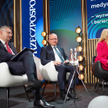Technology is now present in almost every aspect of life, including health care.
Czytaj więcej
Jedno z pytań, na jakie szukali odpowiedzi uczestnicy forum w Karpaczu, dotyczyło roli zarządzani...
- Digitalisation is a challenge and, above all, a huge opportunity for health care systems in Poland and around the world. Further progress in sharing, collecting, and analysing medical data requires the involvement of all stakeholders in the exchange of experience, know-how, and public-private partnerships,” said Maciej Maksymilian Latos, CFO of Roche Polska. - At Roche, we always try to address the health care system challenges comprehensively. That is why, with regard to this particular area of health care, vitally important to the patient and the whole system, we also want to be a partner and support digitisation processes. New solutions, such as the IKP system [Patient’s Online Account] and its functionalities, successfully implemented by the Ministry of Health and Centrum e-Zdrowia [e-Health Centre], are impressive and show the potential for digitalisation in Poland. They lay the foundations for an increasingly strong and patient-friendly health care system, added Maciej Maksymilian Latos.
Information is the key
The discussion addressed legislation, including the European Health Data Space (EHDS) regulations on which the European Commission is working. This is the final stage of work. We support the change but also raise some objections. We have submitted dozens of pages with our comments as many areas need to be clarified and refined. Specifically, we pointed out that digital services of health care entities that are funded in one country cannot automatically be funded by other countries. The European Union cannot get involved in the funding of health systems in this particular case. This is the role of individual countries, said Maciej Miłkowski, Undersecretary of State at the Ministry of Health.
![Experts emphasised that new solutions, such as the IKP system [Patient’s Online Account], can be ver](https://i.gremicdn.pl/image/free/305b8f833b5fee12db99031b482c225a/?t=crop:1600:992:nowe:0:37,resize:fill:948:593,enlarge:1)
























